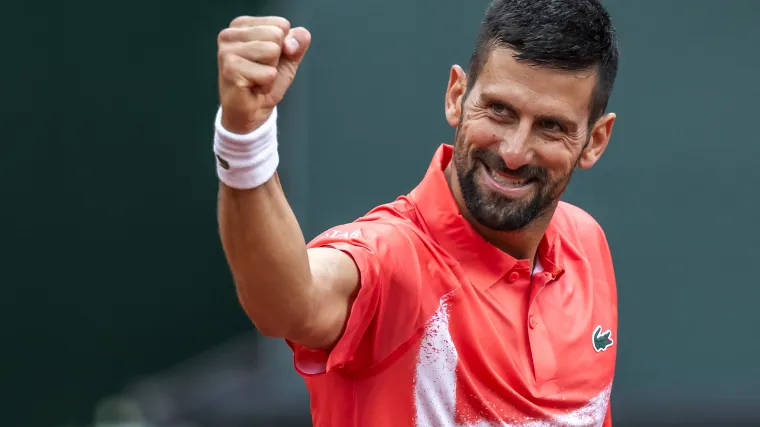JUMP TO:
Winning a grand slam title is something most tennis players dream of from the day they start swinging their racquet.
Despite the difficulty of winning a grand slam tournament, a select few have dominated on the biggest stage throughout the years.
The past two decades, in particular, have seen certain players cement their place in history by winning a record number of grand slam titles.
In 2025, the battle for those records continues, with Wimbledon taking place between June 30 and July 13.
MORE: Revisiting Carlos Alcaraz’s majors timeline
What are the four grand slam tournaments?
In running order, the four grand slam events held each year are:
- Australian Open
- French Open
- Wimbledon
- US Open
The French Open is played on clay, Wimbledon on grass and the other two are held on hard courts.
Wimbledon is the oldest grand slam event, founded in 1877, followed by the US Open four years later, the French Open in 1891, and the Australian Open in 1905.
MORE: Inside the Carlos Alcaraz-Jannik Sinner rivalry
Who has won the most grand slam titles?
Novak Djokovic and Margaret Court currently hold the record for most grand slam singles titles. They have each won 24.
Djokovic took the lead outright in the men’s game by winning his third Roland-Garros title at the 2023 French Open when Rafael Nadal was ruled out through injury.
Nadal had taken sole ownership of the men’s singles record after edging past Roger Federer and Novak Djokovic with his 2022 Australian Open triumph. He then extended his lead at that year’s French Open before Djokovic pulled back within one at Wimbledon.
Djokovic’s victory in the 2023 Australian Open final, where he beat Stefanos Tsitsipas, saw him draw level with Nadal at the top of the men’s standings and, after losing a five-set thriller to Carlos Alcaraz in the Wimbledon final that year, he beat Daniil Medvedev in straight sets at the US Open.
That meant a third grand slam in 2023 and a victory that drew him level with Court’s iconic haul of 24 major tournament triumphs.
Swiss great Federer won’t add to his grand slam haul after announcing his retirement following the Laver Cup in September 2022, while Nadal’s chances of catching Djokovic again are also over after retiring following the Davis Cup in November 2024.
Court, meanwhile, looked set to be caught by Serena Williams, but the American failed to win any of her last four grand slam finals and has also since stepped away from the sport.
Most grand slam titles won by a player: Men’s singles
| Player | Grand slam titles |
|---|---|
| Novak Djokovic | 24 |
| Rafael Nadal | 22 |
| Roger Federer | 20 |
| Pete Sampras | 14 |
| Roy Emerson | 12 |
| Rod Laver | 11 |
| Bjorn Borg | 11 |
| Bill Tilden | 10 |
| Jimmy Connors | 8 |
| Fred Perry | 8 |
| Andre Agassi | 8 |
| Ivan Lendl | 8 |
| Ken Rosewall | 8 |
*Active players have been bolded
Most grand slam titles won by a player: Women’s singles
| Player | Grand slam titles |
|---|---|
| Margaret Court | 24 |
| Serena Williams | 23 |
| Steffi Graf | 22 |
| Helen Wills | 19 |
| Chris Evert | 18 |
| Martina Navratilova | 18 |
| Billie Jean King | 12 |
| Maureen Connolly | 9 |
| Monica Seles | 9 |
| Suzanne Lenglen | 8 |
| Molla Mallory | 8 |
MORE: Why is it called Roland Garros? The legend behind the French Open
Who has won all four grand slams in the same year?
The term ‘Grand Slam’ actually refers to the achievement of winning all four tournaments in the same year.
Winning one title is hard enough, but winning all four straight is extremely difficult.
American Don Budge was the first to achieve a Grand Slam in 1938, with Australian Rod Laver the only other men’s singles player to repeat the feat.
Maureen Connolly was the first woman to pull it off in women’s singles when she did so in 1953. Margaret Court and Steffi Graf are the only other players to have done the same since.
MORE: Inside Rafael Nadal’s record on clay: Spain legend’s French Open legacy stands alone
What is a golden slam and who has completed it?
If a Grand Slam wasn’t rare enough, a Golden Slam requires players to also win Olympic gold on top of the four grand slam events in the same year.
Steffi Graf was the first to complete a Golden Slam in 1988, with only wheelchair players Diede de Groot and Dylan Alcott managing to replicate the feat since.
MORE: Iga Swiatek bakery, explained: How her ‘bagel & breadstick’ dominance has led to meme
Read the full article here



